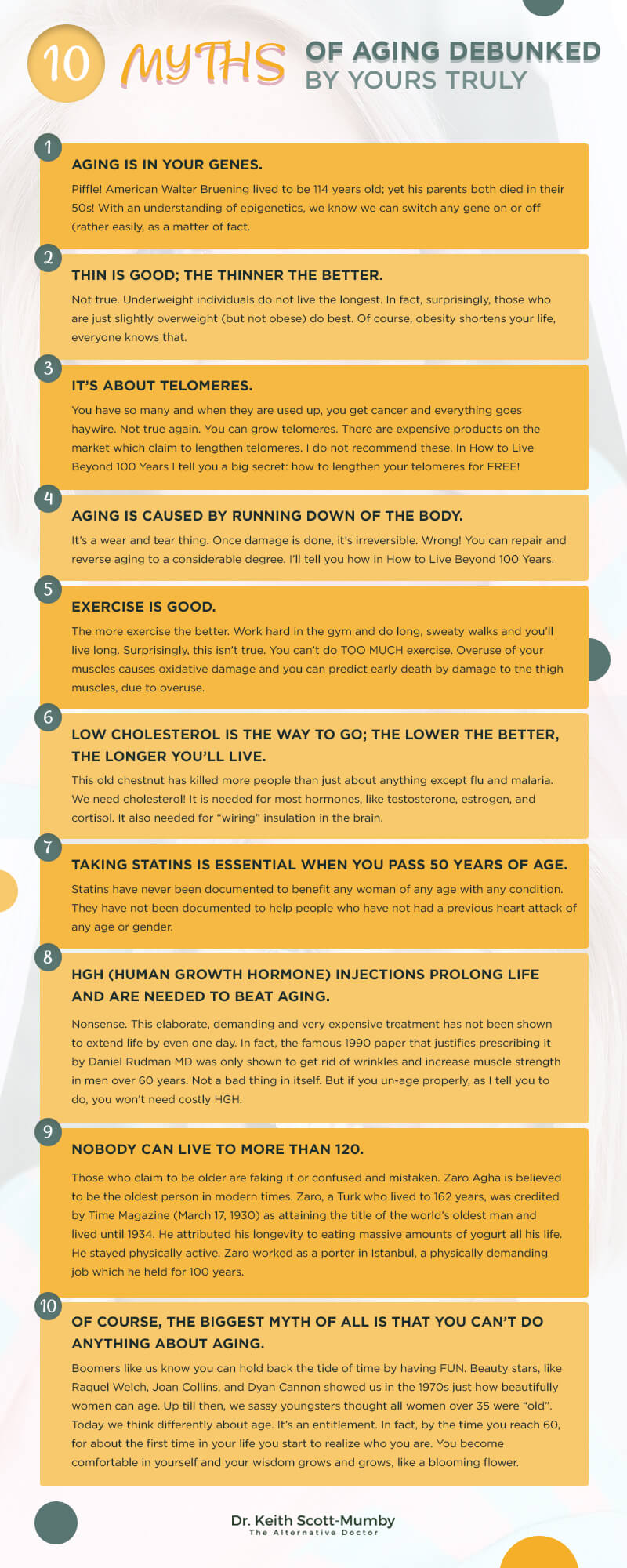Here I am going to share 10 myths of aging. These are false beliefs, often held in place by screwball science (like the cholesterol myth).
Ready? Let’s dive right in!
Myths of Aging #1
Aging is in your genes. Piffle! American Walter Bruening lived to be 114 years old; yet his parents both died in their 50s! With an understanding of epigenetics, we know we can switch any gene on or off (rather easily, as a matter of fact.
Myths of Aging #2
Thin is good; the thinner the better. Not true. Underweight individuals do not live longest. In fact, surprisingly, those who are just slightly overweight (but not obese) do best. Of course obesity shortens your life, everyone knows that.
Myths of Aging #3
It’s about telomeres. You have so many and when they are used up, you get cancer and everything goes haywire. Not true again. You can grow telomeres. There are expensive products on the market which claim to lengthen telomeres. I do not recommend these. In How to Live Beyond 100 Years I tell you a big secret: how to lengthen your telomeres for FREE!
Myths of Aging #4
Aging is caused by running down of the body. It’s a wear and tear thing. Once damage is done, it’s irreversible. Wrong! You can repair and reverse aging to a considerable degree. I’ll tell you how in How to Live Beyond 100 Years.
Myths of Aging #5
Exercise is good. The more exercise the better. Work hard in the gym and do long, sweaty walks and you’ll live long. Surprisingly, this isn’t true. While being a couch potato is definitely a bad thing, you can do TOO MUCH exercise. Over use of your muscles causes oxidative damage and you can predict early death by damage to the thigh muscles, due to overuse.
Myths of Aging #6
Low cholesterol is the way to go; the lower the better, the longer you’ll live. This old chestnut has killed more people than just about anything except flu and malaria. We need cholesterol! Real science (not science paid for by Pfizer and AstraZeneca) makes it clear that people with the lowest cholesterol levels die younger than the rest of us.
Although this is counter to the propaganda, it shouldn’t surprise anyone because cholesterol is needed for most hormones, like testosterone, estrogen and cortisol. It also needed for “wiring” insulation in the brain. To blame raised cholesterol for heart damage is like saying the red oil warning light caused the damage to a neglected car engine.
Myths of Aging #7
Taking statins is essential when you pass 50 years of age. This blatant and outrageous hooey is perpetuated by supposed “experts” like Professor Sir Rory Collins. Well, guess what: he gets lots of money from pharmaceutical companies (not as bribes but as grants that enable him to plough his furrow and pay the mortgage). The real truth comes from another source altogether: Statins have never been documented to benefit any woman of any age with any condition. They have not been documented to help people who have not had a previous heart attack of any age or gender.
Of course I give you the whole story in the bonus booklet “The Truth About Statins and Cholesterol” which accompanies my major work How to Live Beyond 100 Years.
Myths of Aging #8
hGH (human growth hormone) injections prolong life and are needed to beat aging. Nonsense. This elaborate, demanding and very expensive treatment has not been shown to extend life by even one day. In fact the famous 1990 paper that justifies prescribing it by Daniel Rudman MD was only shown to get rid of wrinkles and increase muscle strength in men over 60 years. Not a bad thing in itself. But if you un-age properly, as I tell you to do, you won’t need costly hGH.
Myths of Aging #9
Nobody can live to more than 120. Those who claim to be older are faking it or confused and mistaken. This baloney has been going around for years. There are people out there who just don’t WANT people to live long, miserable and poop-faced, who insist that nobody CAN live longer than that and THEREFORE anyone who says they did is just wrong.
They are using this technique with Antisa Khvichava, who died recently. They want to argue over whether she reached 130 or not and imply she faked it.
I cite you a case in the book with government certificates every 50 years, who lived well past 250 years.
Moreover, in 1973 National Geographic Magazine featured an article by US doctor Alexander Leaf in which he and his team researched a woman called Khfaf Lasuria. Having studied the case were sure she was at least 130 years and sure she was not more than 140 years old.
But we have better:
Zaro Agha is believed to be the oldest person in modern times. Zaro, a Turk who lived to 162 years, was credited by Time Magazine (March 17, 1930) as attaining the title of the world’s oldest man. He was born two years before the signing of the American Declaration of Independence, and lived until 1934.
He attributed his longevity to eating massive amounts of yogurt all his life. He stayed physically active. Zaro worked as a porter in Istanbul, a physically demanding job which he held for 100 years. Zaro was the subject of much scientific and popular curiosity.
Myths of Aging #10
Of course the biggest myth of all is that you can’t do anything about aging . Medical “science” (sniff!) has been peddling that story for a hundred years or more. It’s simply not true.
Boomers like us know you can hold back the tide of time by having FUN; lots of it. Beauty stars, like Raquel Welch, Joan Collins and Dyan Cannon showed us in the 1970s just how beautifully women can age. Up till then, we sassy youngsters thought all women over 35 were “old”.

Dyan Cannon at 80 years
It’s really about perception. Today we think differently about age. It’s an entitlement. In fact by the time you reach 60, for about the first time in your life you start to realize who you are. You become comfortable in yourself and your wisdom grows and grows, like a blooming flower.
Make sure your later years unfold like glowing flowers. Get How to Live Beyond 100 Years here and start reading, OK?
As it says on the page “Forget about three score years and ten. What about six score years and ten?” (130 years)

References:
1. Leaf, Alexander. “Every Day Is a Gift When You Are Over 100.” National Geographic (January 1973), 92-119

